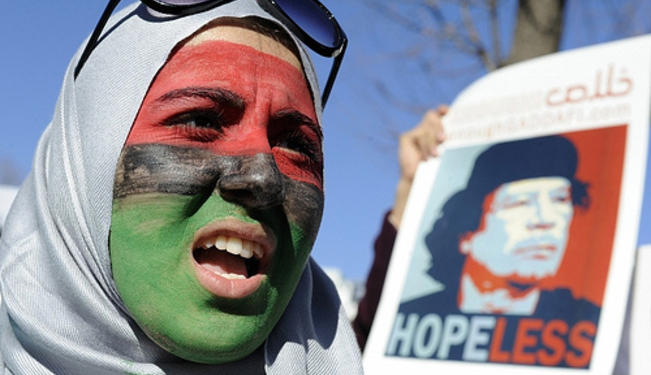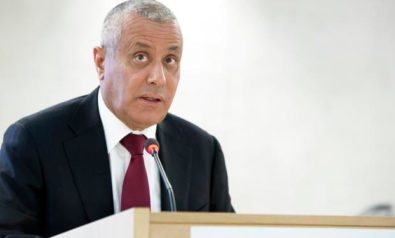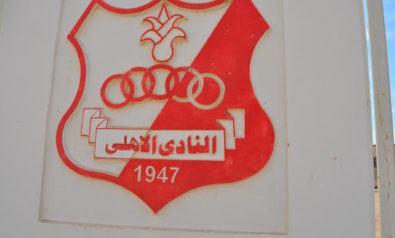
A brief look at the modern history of Libya as the country gears up for its first post-Qaddafi election. Background The North African country of Libya gained its independence in 1951 following 40 years of Italian colonial rule. Under Italian control, Libya was divided into three provinces: Cyrenaica, Tripolitania, and Fezzan. During both World Wars, resistance to Italian occupation and rule was led by Idris al-Mahdi as-Senussi, the Emir of Cyrencaica. Between 1943 and 1951, the British administered Tripolitania and Cyrenaica while Fezzan was under French control. The UN General Assembly, meanwhile, passed a resolution in 1949 stating Libya should become independent before the start of 1952. Subsequently, on December 24, 1951, Libya was declared an independent state with a constitutional and hereditary monarchy under as-Sennusi, now known as King Idris. The new monarch's rule was short lived, however. Despite the discovery of vast oil reserves in 1959 which helped expand the nation's wealth, resentment grew amongst portions of the population who saw the oil revenue falling into the hands of the monarch. Due to the subsequent rise of nationalism and Pan-Arabism in Gamal Abdel Nasser's Egypt, the relationship between imperial nations and King Idris was seen by some as a threat to Libya's sovereignty. Consequently, in 1969, Muammar Qaddafi and his Free Officers' Movement staged a coup d’état and ousted King Idris in what came to be known as the Libyan Revolution. Qaddafi, the new ruler of Libya, saw the military coup as the start of a complete transformation of the political, social, and economic principles of the country. The new Libya was described by Qaddafi as a base of Arab nationalism and Islamic socialism, where Libyans would manage their own lives directly and prosper. In reality, however, Qaddafi ruled Libya with an iron-fist and was the sole decision-maker, along with his group of loyalists. Indeed, the combination of repression and authoritarianism created a system which revolved around the ruler and subjugated significant portions of the population. The regime refused to tolerate political dissent and soon abolished any political activity against the revolution or the state. Significantly, Qaddafi quashed any Islamic threat to his rule. He restricted the role of the ulema (the clergy) and elevated himself as the authority on religious life. Qaddafi managed to stamp out opposition from the Libyan Muslim Brotherhood, and many members were imprisoned or forced into exile. In 1996, at the main Abu Salim prison, guards killed nearly 1,300 inmates — mostly political prisoners, including Islamists. Abdullah al-Senussi, Qaddafi's brother-in-law, was accused of giving the order to shoot inmates on prison grounds, by a firing-squad. The murder of prisoners at Abu Salim became a rallying call over the years for opposition figures and movements against Qaddafi's rule. The Libyan regime was also said to have been involved in various terrorist attacks against Western targets including the infamous Lockerbie bombing, which saw the conviction of Abdel-Baset al-Megrahi. Similar incidents over the years saw strained relations with the West, particularly due to Tripoli's pursuit of weapons of mass destruction (WMD). However in 2003, Qaddafi said Libya had abandoned its WMD programme, which effectively opened the door to a new relationship with the West. Why is Post-Qaddafi Libya Relevant? Following the ouster of Egypt's Hosni Mubarak, the Arab uprisings reached Libya in February 2011. The Libyan uprising saw the country become polarised between Qaddafi loyalists and revolutionaries seeking to oust the former leader. A full-scale civil war subsequently ensued with NATO intervening and backing the Libyan opposition with a no-fly-zone. On October 20, 2011, Qaddafi was captured and killed by revolutionary fighters. An interim government, the National Transitional Council, has since governed Libya. The council announced in October that elections for a constituent assembly would take place in eight months. The elections, on July 7, were initially scheduled to take place at the end of June but were postponed to allow more time for voters to register and to deal with complaints from the multiple candidates. Several issues, including security concerns, have marred the transition following the civil war. Since a significant proportion of opposition fighters still have access to weapons, there are various militias still present in the country. The incoming constituent assembly and the new interim government will need to reform various aspects of Libya by enacting social, political, and economic change. Libya lacks established institutions to assist the government in developing the oil rich nation, which has seen its economy become stagnant over the years. Significant areas that are in desperate need of change include the country's security apparatus, unemployment, and the judiciary. Despite the issues surrounding Libya's transition in the post-Qaddafi era, the Libyan people have shown resilience by ousting the former dictator and his regime. Moreover, they have shown a willingness to become more politically active in helping to shape their country's future. The transition of Libya promises to be an interesting one.
For more than 10 years, Fair Observer has been free, fair and independent. No billionaire owns us, no advertisers control us. We are a reader-supported nonprofit. Unlike many other publications, we keep our content free for readers regardless of where they live or whether they can afford to pay. We have no paywalls and no ads.
In the post-truth era of fake news, echo chambers and filter bubbles, we publish a plurality of perspectives from around the world. Anyone can publish with us, but everyone goes through a rigorous editorial process. So, you get fact-checked, well-reasoned content instead of noise.
We publish 2,500+ voices from 90+ countries. We also conduct education and training programs on subjects ranging from digital media and journalism to writing and critical thinking. This doesn’t come cheap. Servers, editors, trainers and web developers cost money.
Please consider supporting us on a regular basis as a recurring donor or a sustaining member.
Support Fair Observer
We rely on your support for our independence, diversity and quality.
Will you support FO’s journalism?
We rely on your support for our independence, diversity and quality.









